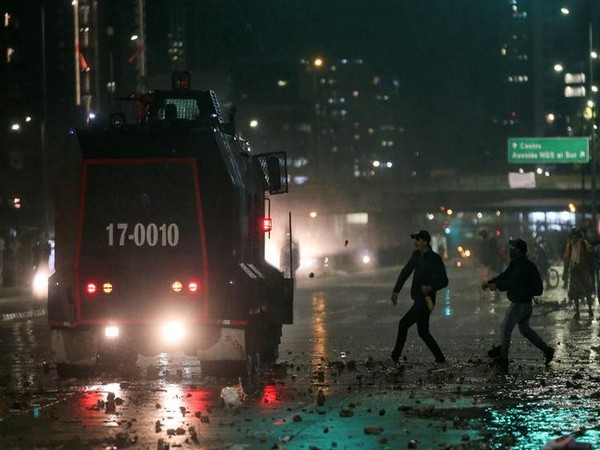Colombians try to revive mass protest against government, police violence
"I'm here to demand respect for life, respect of the rights of workers, an end to worsening police violence against protesters," said 38-year-old lawyer Diana Amezquita, as she waved a white flag outside the ministry. The death this month of a man detained and repeatedly stun-gunned by police lead to several nights of protests in the capital Bogota and satellite city Soacha.

- Country:
- Colombia
Colombia's largest unions lead protests on Monday against the social and economic policies of President Ivan Duque, seeking to revive mass demonstrations after recent incidents of police brutality in which 13 people died and hundreds were injured.
Protesters rode to the labor ministry on bicycles, motorcycles and in cars decorated with green balloons and signs. The caravan was an attempt by demonstrators to comply with coronavirus restrictions which mandate face masks and ban large crowds. "I'm here to demand respect for life, respect of the rights of workers, an end to worsening police violence against protesters," said 38-year-old lawyer Diana Amezquita, as she waved a white flag outside the ministry.
The death this month of a man detained and repeatedly stun-gunned by police lead to several nights of protests in the capital Bogota and satellite city Soacha. The deaths and injuries during the demonstrations stoked anger among some Colombians already distraught at mass murders and assassinations of human right activists. On Monday, Bogota's mayor Claudia Lopez said public transport would shut at 8 p.m. and encouraged people to return home as early as possible.
Union and student leaders hope to rejuvenate widespread protests which took place in November and December last year. Isolated looting associated with the protests lead to the first curfew declarations in a generation in Bogota and Cali, but demonstrations fizzled ahead of the Christmas holidays. Earlier this year, the coronavirus pandemic stymied supporters of the protests, as more than 765,000 Colombians were infected and more than 24,000 died. The country gradually loosened lockdown measures between March and the end of August.
The economy took a big hit from the lockdown. Urban unemployment surged to nearly 25% and the government predicts economic contraction of 5.5% this year. The downturn could galvanize protesters who believe potential pension and tax reforms will hurt workers. The government has not yet announced specific reform plans.
(This story has not been edited by Devdiscourse staff and is auto-generated from a syndicated feed.)
- READ MORE ON:
- Ivan Duque
- Colombia
- Bogota
- Claudia Lopez
- COVID-19
ALSO READ
Colombia's capital implements water rationing amid historic drought exacerbated by El Nino
Divisions among Colombia's EMC rebels fracture peace talks, rebel leader and government say
UAE and Colombian Presidents witness signing of UAE-Colombia Comprehensive Economic Partnership Agreement
Ecopetrol and Petrobras should collaborate on green hydrogen, Colombian president says
UAE and Colombia sign comprehensive economic partnership agreement, UAE president says










